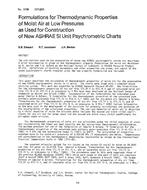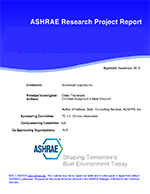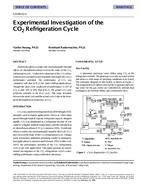The majority of commercial roofs consist of corrugated steel roof decks, with or without concrete fill. Steel decks used with concrete fill typically contain perforations along the ribs (flutes) to allow drying of the concrete, termed “vented decks.” Steel roof decks without concrete fill are typically “unvented,” but still have seams that are only tack welded or mechanically fastened together. Decks without concrete fill have additional penetrations due to fasteners used to attach insulation and roofing membrane layers. Despite being an integral part on the majority of all commercial roofs, surprisingly little research has been performed to study the air and vapor permeance of steel roof deck construction. Designers are forced to estimate the effect on the air and vapor permeance of steel roof decks that results from unsealed laps and fastener penetrations, as well as intentional vents (perforations). The quantification of these effects is needed for use as inputs into hygrothermal models.
This paper presents the results of a series of laboratory experiments designed to quantify the air and vapor permeance of several steel deck constructions, including vented and non-vented decks and including the effect on permeance when the metal deck is filled with concrete. This paper provides values for designers to use in hygrothermal models for both design and investigation of roof systems containing metal deck.
Presented at Thermal Performance of Exterior Envelopes of Whole Buildings XII, December 2013
Citation: Thermal Performance of Exterior Envelopes of Whole Buildings XII
Product Details
- Published:
- 2013
- Number of Pages:
- 15
- File Size:
- 1 file , 6.4 MB
- Product Code(s):
- D-BldConf13-49


